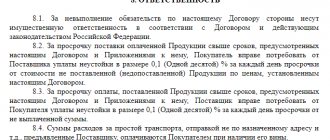Material liability of the employee
In accordance with Art. 233 of the Labor Code of the Russian Federation (hereinafter referred to as the Labor Code of the Russian Federation), the employee’s financial liability arises for damage caused to the employer as a result of his guilty unlawful behavior (actions or inaction). Thus, any employee can be held financially liable if he unlawfully and culpably caused damage to the employer’s property.
Unlawfulness in relation to labor relations means that material damage arose as a result of the employee’s failure to perform or improper performance of his duties, which are assigned to the employee by law, an employment contract, or local regulations in force at the employer. The employee's financial liability is excluded in cases of damage due to force majeure, normal economic risk, extreme necessity or necessary defense, or the employer's failure to fulfill the obligation to provide adequate conditions for storing property entrusted to the employee (Article 239 of the Labor Code of the Russian Federation).
In addition, in order to talk about the occurrence of material liability for damage caused, a cause-and-effect relationship must be established between the employee’s action and the resulting material damage.
Thus, the employee’s financial liability occurs only if the following conditions are simultaneously present:
- unlawful behavior (actions or inaction) of an employee
- the employee’s guilt in committing an unlawful act (inaction)
- a causal connection between the employee’s unlawful action and material damage;
- absence of circumstances excluding the employee’s financial liability.
The employee is obliged to compensate the employer for direct actual damage caused to him. Lost income (lost profits) cannot be recovered from the employee. Direct actual damage is understood as a real decrease in the employer’s available property or deterioration in the condition of said property (including property of third parties located at the employer, if the employer is responsible for the safety of this property), as well as the need for the employer to make costs or excessive payments for the acquisition, restoration of property or compensation for damage caused by the employee to third parties (Article 238 of the Labor Code of the Russian Federation).
In this case, each party to the employment contract is obliged to prove the amount of damage caused to it. Basically, disputes arise over the amount of compensation for damage caused by the employee.
The amount of damage caused to the employer in the event of loss and damage to property is determined by actual losses, calculated on the basis of market prices prevailing in the area on the day the damage was caused, but not lower than the value of the property according to accounting data, taking into account the degree of wear and tear of this property (Article 246 Labor Code of the Russian Federation).
Recovery of damages from the guilty employee for the amount of damage caused is carried out by order (instruction) of the manager. An order to recover damages from an employee must be issued no later than one month from the date of final determination of the amount of damage caused by the employee. Otherwise, the damage will have to be recovered through the court (Article 248 of the Labor Code of the Russian Federation).
The employer must require a written explanation from the employee to establish the cause of the damage. And if the employee refuses to provide an explanation, the employer draws up a corresponding act of refusal.
For example, an employer carries out an inventory after the dismissal of a financially responsible employee, which makes it impossible to hold a former employee who committed a shortage to financial liability (Determination of the RF Armed Forces dated May 7, 2018 No. 66-KG18-6).
The amount of material damage caused, which is recovered from the employee, directly depends on what kind of liability is provided for it: full or limited.
LIMITED LIABILITY
The limits of an employee’s financial liability are established by Article 241 of the Labor Code of the Russian Federation and are limited by the amount of his average monthly earnings, unless otherwise provided by the Labor Code of the Russian Federation or other federal laws.
If the amount of damage exceeds the employee’s average monthly earnings, the employee is obliged to compensate only that part of it that is equal to his average monthly earnings. If the concluded employment contract does not provide for full financial liability for damage caused to the employer, then the employee will bear financial responsibility for the damage caused within the limits of his average monthly earnings on the basis of Article 241 of the Labor Code of the Russian Federation.
At the same time, the rule on limited financial liability of an employee within the limits of his average monthly earnings is applied in all cases, except for those in respect of which the Labor Code of the Russian Federation or other federal law directly establishes a higher financial liability of the employee, in particular full financial liability.
FULL MATERIAL RESPONSIBILITY
In accordance with the provisions of Art. 243 of the Labor Code of the Russian Federation, financial liability in the full amount of damage caused is assigned to the employee in the case (clause 4 of the Resolution of the Plenum of the Armed Forces of the Russian Federation dated November 16, 2006 No. 52, letter of Rostrud dated October 19, 2006 No. 1746-6-1):
1) when, in accordance with the law, the employee is charged with financial responsibility in full for damage caused to the employer during the performance of the employee’s job duties. In this case, we are talking about those situations where the law directly provides for the employee’s obligation to compensate for damage in full. For example, the head of an organization, regardless of whether the employment contract with him contains a condition on full financial liability, bears full financial responsibility for direct actual damage caused to the organization (Article 277 of the Labor Code of the Russian Federation, paragraph 9 of the Resolution of the Plenum of the Supreme Court of the Russian Federation dated November 16 .2006 No. 52);
2) shortage of valuables entrusted to him on the basis of a special written agreement or received by him under a one-time document. We are talking about the most common situation when an employee enters into an agreement with the employer on full financial responsibility;
3) intentional infliction of damage. Since the Labor Code of the Russian Federation does not disclose the concept of intentionality of causing damage, one can use by analogy the norms of the Criminal Code of the Russian Federation (Article 25), according to which intent can be direct (if the person was aware of the danger of his actions (inaction), foresaw the possibility or inevitability of the consequences and desired them offensive) and indirect (if the person was aware of the danger of his actions (inaction), foresaw the possibility of consequences, did not want, but consciously allowed these consequences or was indifferent to them);
4) causing damage while under the influence of alcohol, drugs or other toxic substances. The state of intoxication can be confirmed both by a medical report and by other types of evidence (for example, witness testimony), which will be assessed by the court. For full financial liability to arise on this basis, it is necessary not only to establish the fact of intoxication of the employee, but also the existence of a cause-and-effect relationship between the damage and the behavior of the intoxicated employee, that is, the fact of intoxication and the fact of damage themselves do not cause full financial liability;
5) damage caused as a result of the employee’s criminal actions established by a court verdict. The presence of a court conviction is a prerequisite for bringing an employee to full financial liability on this basis, therefore, termination of a criminal case at the stage of preliminary investigation or in court, including on non-rehabilitative grounds (in particular, due to the expiration of the statute of limitations for criminal prosecution, as a result of the amnesty act), or an acquittal by the court cannot serve as a basis for bringing a person to full financial responsibility;
6) damage caused as a result of an administrative violation, if such is established by the relevant government body and a decision is made to impose an administrative penalty. If an employee has been released from administrative liability for committing an administrative offense due to its insignificance, he can still be held financially liable in full, since if the administrative offense is insignificant, the fact of its commission is established. The expiration of the statute of limitations for bringing to administrative responsibility or the issuance of an amnesty act eliminating the application of administrative punishment excludes the employer from the possibility of bringing the employee to full financial liability on this basis;
7) disclosure of information constituting a secret protected by law (state, official, commercial or other), in cases provided for by the relevant federal laws;
 causing damage not while the employee was performing his job duties. On this basis, bringing full financial liability to full liability does not matter when the damage occurred - outside or directly during working hours (for example, an employee damaged the employer’s equipment while attending to his personal affairs during working hours).
causing damage not while the employee was performing his job duties. On this basis, bringing full financial liability to full liability does not matter when the damage occurred - outside or directly during working hours (for example, an employee damaged the employer’s equipment while attending to his personal affairs during working hours).
EVGENIYA TAYANOVA
, SENIOR PROSECUTOR OF THE DEPARTMENT FOR SUPERVISION, OVER THE EXECUTION OF LAWS IN THE SOCIAL SPHERE AND ON MINORS, OFFICE OF THE PROSECUTOR OF THE KHABAROVSK REGION
Source of publication: information monthly “The Right Decision” issue No. 10 (204) release date of 10/21/2019.
The article was posted on the basis of an agreement dated October 20, 2016, concluded with the founder and publisher of the information monthly “Vernoe Reshenie” LLC “.
Article 240. The employer’s right to refuse to recover damages from an employee
The employer has the right, taking into account the specific circumstances in which the damage was caused, to fully or partially refuse to recover it from the guilty employee. The owner of the organization's property may limit the specified right of the employer in cases provided for by federal laws, other regulatory legal acts of the Russian Federation, laws and other regulatory legal acts of the constituent entities of the Russian Federation, regulatory legal acts of local government bodies, and the constituent documents of the organization.
(as amended by Federal Law No. 90-FZ of June 30, 2006)
Article 248. Procedure for recovery of damages
Recovery from the guilty employee of the amount of damage caused, not exceeding the average monthly earnings, is carried out by order of the employer. The order can be made no later than one month from the date of final determination by the employer of the amount of damage caused by the employee.
If the month period has expired or the employee does not agree to voluntarily compensate for the damage caused to the employer, and the amount of damage caused to be recovered from the employee exceeds his average monthly earnings, then recovery can only be carried out by the court.
(as amended by Federal Law No. 90-FZ of June 30, 2006)
If the employer fails to comply with the established procedure for collecting damages, the employee has the right to appeal the employer’s actions in court.
An employee who is guilty of causing damage to the employer may voluntarily compensate for it in whole or in part. By agreement of the parties to the employment contract, compensation for damage by installments is allowed. In this case, the employee submits to the employer a written obligation to compensate for damages, indicating specific payment terms. In the event of dismissal of an employee who gave a written commitment to voluntarily compensate for damage, but refused to compensate for the specified damage, the outstanding debt is collected in court.
With the consent of the employer, the employee may transfer equivalent property to compensate for the damage caused or repair the damaged property.
Compensation for damages is made regardless of whether the employee is brought to disciplinary, administrative or criminal liability for actions or inactions that caused damage to the employer.



